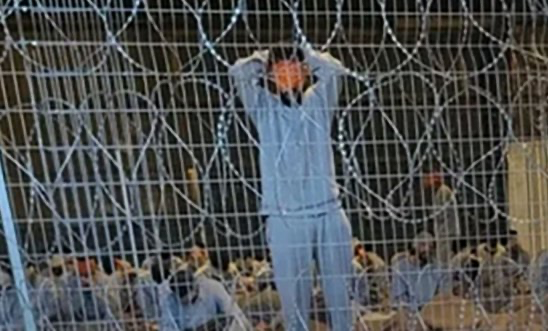New Investigation Reveals Most Palestinians Held Without Charge or Trial in Israeli Jails Are Civilians

Occupied Palestine (Quds News Network)- A new investigation, based on classified data from an Israeli military database, has revealed that only one in four detainees from Gaza are identified as fighters, with civilians making up the overwhelming majority of Palestinians held without charge or trial in Israeli jails.
The joint probe by the Guardian, +972 magazine and the Hebrew-language outlet Local Call has found those jailed for long periods without charge or trial include medical workers, teachers, civil servants, media workers, writers, sick and disabled people and children.
Among the most egregious cases are those of an 82-year-old woman with Alzheimer’s jailed for six weeks and of a single mother separated from her young children. When the mother was released after 53 days she found the children begging on the streets.
In May this year, the database listed 1,450 people in detention, whose files were marked “arrested”. That is equivalent to just one in four of all Palestinians from Gaza who are identified as fighters.
At that point in May Israel had detained 6,000 people under its “unlawful combatants” legislation, which allows indefinite imprisonment without charge or trial, official data released after legal appeals showed.
When photos of Palestinians stripped and shackled caused international outrage in late 2023, senior officers told Haaretz newspaper that “85 to 90 per cent” were not Hamas members.
The Gaza-based Al Mezan Center for Human Rights has represented hundreds of civilians held in Israeli jails. “We believe the proportion of civilians among those detained is even higher than Israel’s own figures suggest,” said Samir Zaqout, Mezan’s deputy director.
“At most, perhaps one in six or seven might have any link to Hamas or other militant factions, and even then, not necessarily through their military wings.”
Israel’s military said it had returned more than 2,000 civilian detainees to Gaza after finding no connection to resistance activity, accorring to the probe.
In May 2,750 Palestinians were permanently interned as “unlawful combatants”, and another 1,050 had been released under ceasefire deals, according to the military, as cited in the probe,.
One soldier who served at Sde Teiman military prison, which became notorious for abuse, described mass detentions of elderly and severely ill people.
“They brought men in wheelchairs, people without legs,” he said, adding these detainees were sent to a “geriatric pen”. “I always assumed the supposed excuse for arresting patients was that maybe they had seen the hostages or something.”
Hassan Jabareen, the director of the Palestinian legal rights group Adalah said Israel’s unlawful combatants legislation was “designed to facilitate the mass detention of civilians and enforced disappearances”.
“It strips detainees of protections guaranteed under international law, including safeguards specifically intended for civilians, using the ‘unlawful combatant’ label to justify the systematic denial of their rights.”
Israeli troops deployed to guard Palestinians often opposed releasing civilians cleared of any Hamas links, an Israeli stationed at a military facility said. They wanted to hold them indefinitely as leverage in prisoner negotiations.
Israeli politicians have expressed similar sentiments.
When Mohammed Abu Salmiya, the director of Gaza’s Shifa hospital, was released last year, Simcha Rothman, chair of the Knesset’s constitution, law and justice committee, complained that he was freed “not in exchange for hostages”.
Rights groups suspect this approach has unofficially been a driver of mass detentions throughout the war. “Even before 7 October, Israel withheld the bodies of hundreds of Palestinians, using them as bargaining chips instead of returning them to their families for burial,” said a spokesperson for Al Mezan.
“We believe the thousands of civilians from Gaza now in detention are likewise intended to be used as bargaining chips.”
The majority of people held as unlawful combatants are also effectively kept incommunicado, deepening anguish for both those in jail and their loved ones in Gaza.
The unlawful combatants legislation has been used to facilitate the “forced disappearance of hundreds and even thousands of people”, said Jessica Montell, the director of the legal rights organisation HaMoked.
By August, Israel’s prison service held a record 2,662 unlawful combatants, data obtained by HaMoked showed. An unknown number more are in military detention facilities.
One Israeli officer who led mass arrest operations in Khan Younis in southern Gaza said soldiers saw no difference “between a terrorist.. and someone working for the water authority in Khan Younis”.




